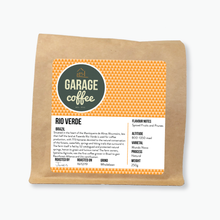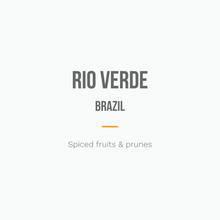Tasting Notes
Roast Level: Medium
Process: Pulped natural
Varietal: Catuaí
Roaster's Notes: A very easy drinking, Brazilian coffee which has an interesting spiciness too it. Works great as a full bodied espresso.
Farm Info
Producer: Ipanema Agricola
Region: Sul de Minas, Minas Gerais
Altitude: 800 - 1,350 metres
Background Information
Rio Verde is one of the smaller farms nestled in the wider estate. Founded in 1887, it is the oldest of the company's farms. Located in the heart of the Mantiqueira de Minas Mountains, this 1,566 hectare farm is a true natural sanctuary, where coffees are grown at elevations of up to 1,300 meters above sea level, surrounded by virgin forests, waterfalls, springs and hiking trails. In fact, the farm is home to 52 catalogued springs, all of which are protected. Only 626 hectares of the farm are given over to coffee production, with a full 773 hectares being devoted to conservation. To this end, Ipanema has created the Environment Monitoring Centre (EMC), which has been installed in an old henhouse on the farm. The Centre monitors farm management practices as related to water use, soil fertility and erosion, vegetation and climate.
The farm was already established before the newly married Antonio Fachardo Junqueira and Gabriella Augusta inherited the farm as a dowry. However, it was the couple who first established coffee here in 1887. In 1920, their grandson, Antenor, took over management of the farm and began implementing incredibly innovative processes for the time, separating lots by quality and color and constructing brick patios to improve the drying process.
During the period between World War I and the Economic Crisis of 1929, the farm went through great difficulties and to deal with them, Antenor made great efforts to become self-sufficient in the production of flour, cachaça, sweets and jams, beef, chicken, pork, wool, and various herbs and vegetables. In 1964, Antenor’s son-in-law, Luiz Cyrillo Fernandes assumed control of the farm and continued innovations and sustainability efforts, building new infrastructure for wet and dry processing and milling of the coffees. He also invested in an intense soil fertilisation program. 81 separate chicken sheds were filled with 136,000 hens solely with the aim of generating 800 tonnes of organic fertilizer a year. This program ran from 1964 through to 1992.
Luiz Cyrillo Fernandes himself continued to lead the business and was involved in all decision making up until 2002. Always aiming for the most innovative techniques and equipment, he traveled widely to find ways to improve coffee production. Through his work during this time, Ipanema Coffees was a pioneer in introducing procedures that are now standard practice in Brazil, such as pruning techniques and mechanical harvesting. After the liberalisation of trade in 1991, Ipanema Coffees was one of the first companies to begin exporting products abroad. In the same year the first coffee bags were shipped to Europe, and thousands of other shipments followed.
In 2002, engineer and current CEO, Washington Rodrigues, stepped into the founding family’s footsteps. He was responsible for various innovations and solutions which allowed the company to enter into new markets and build up long-lasting relationships with buyers.
Under his leadership some of the company`s achievements became milestones in the history of coffee in Brazil. For example, Ipanema Coffees was one of the first companies to construct infrastructure for wet milling and was the first to be certified by Utz and Rain Forest certification programs. Specialty coffees became the company`s flagship. Until now Ipanema Coffees is a permanent participant at International specialty coffee fairs and is also a founder of the Brazil Specialty Coffee Association (BSCA). Their Premier Cru project, initiated in 2014, has taken specialty coffee to new heights in the country, and they continue striving yearly for more.




